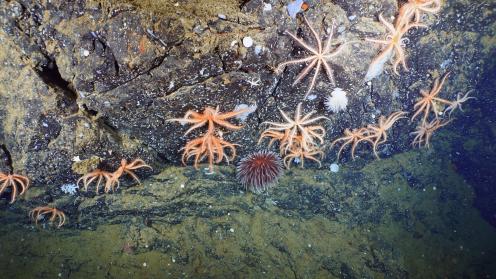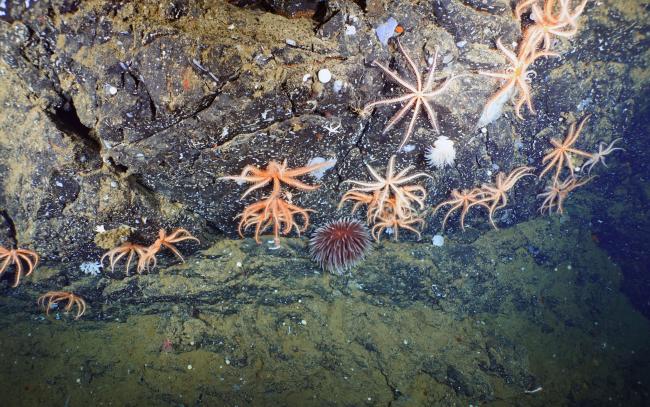About
The meeting is expected to clarify possible scenarios given the rapid approach of the deadline triggered by Nauru’s request to apply for approval of a deep-sea mineral exploitation plan.
Final report
Summary report 10–28 July 2023
All coverage
The debate over commercial exploitation of mineral resources from the deep ocean floor has been attracting increasing attention from the international ocean community and beyond. All mineral-related activities in the international seabed area are “organized, regulated, and controlled” by the International Seabed Authority (ISA) for “the benefit of mankind as a whole.”
The debate over commercial exploitation of mineral resources from the deep ocean floor has intensified during the last couple of years. Those against mining focus on the need to protect the ocean—already challenged by climate change, pollution, and acidification—and to study these little-known deep-sea ecosystems, prior to authorizing potential extractive activities. They urge for a moratorium on commercial exploitation to ensure that mining activities do not harm marine deep-sea ecosystems, stressing that whether to proceed with deep-sea mining is a political, ethical, and philosophical concept. Those in favor point towards a sustainable supply of nickel, manganese, cobalt, or copper, which, they argue, is essential for a worldwide energy transition. They further underscore considerable costs, including environmental ones, associated with land-based mining of the same minerals.
The ISA has been trying to balance these concerns through the development of the “Mining Code,” which is the set of rules, regulations, and procedures to regulate prospecting, exploration, and exploitation of minerals in the international seabed “Area”. The Area is defined as “the seabed and ocean floor and the subsoil thereof, beyond the limits of national jurisdiction.”
So far, the Authority has issued regulations on Prospecting and Exploration (for polymetallic nodules, polymetallic sulphides, and cobalt-rich ferromanganese crusts) and issued relevant exploration contracts. It is currently focusing on the development of regulations for the exploitation of mineral resources in the Area.
Discussions heated up recently due to the “two-year rule,” also known as the “trigger” or “deadline,” and colloquially referred to as the “what if” scenario. This refers to a provision in the 1994 Agreement relating to the implementation of the UN Convention on the Law of the Sea (UNCLOS) Part XI (the Area). The provision notes that if the ISA Council has not completed the elaboration of the regulations relating to exploitation within two years following the request of a state who intends to apply for approval of an exploitation plan, then the Council “shall nonetheless consider and provisionally approve such plan of work” based on the provisions of the Convention and any rules that the Council may have adopted provisionally. On 25 June 2021, Nauru submitted such a request, in connection with its contractor Nauru Ocean Resources Inc.
During the first part of the 28th ISA session, held in March 2023, some delegates and many Council observers expressed concern over potential provisional approval of a plan of work for exploitation without the necessary holistic regulatory framework in place. The second part of the meeting is expected to clarify the potential scenarios as the deadline triggered from Nauru’s request is fast approaching.
The bulk of the Council’s work during the second part of the 28th session will focus on the development of the exploitation regulations. Discussions are organized through working groups, which address:
- the protection and preservation of the marine environment;
- the financial terms of a deep-sea mining contract;
- inspection, compliance, and enforcement; and
- institutional matters.
The Council will hear the report of the Secretary-General on the status of national legislation relating to deep-seabed mining and on the implementation of the Council decision related to the reports of the Legal and Technical Commission (LTC). Delegates will further hear reports on: the work of the LTC and the Finance Committee; proposed amendments to the statute of the International Civil Service Commissions; and the outcome of the intersessional dialogue on the two-year rule. They will also consider matters related to the Enterprise and the operationalization of the Economic Planning Commission.
The ISA Assembly will:
- consider and adopt the strategic plan for the Authority for the five-year period 2024-2028;
- listen to the annual report of the Secretary-General, the statement of the President of the Council on its work, and the report and recommendations of the Finance Committee;
- consider and adopt a supplementary budget for the financial period 2023-2024;
- elect a member to fill a vacancy on the Finance Committee and consider requests for observer status; and
- foster international and regional cooperation to support stewardship of the Area.
The second part of the 28th session of the ISA includes meetings of the LTC (28 June – 7 July 2023), the Finance Committee (5-7 July 2023), the Council (10-21 July 2023) and the Assembly (24-28 July 2023). The meetings will be held in ISA headquarters, in Kingston, Jamaica.
The Earth Negotiations Bulletin (ENB) will be providing daily web coverage and a summary and analysis from the Council and Assembly meetings, beginning on 10 July 2023.
The ENB writers for this meeting are Asterios Tsioumanis, Ph.D. and María Ovalle. The Digital Editor is Diego Noguera. The Editor is Pam Chasek, Ph.D.
View past and future events
Past event
23rd Annual Session of the International Seabed Authority
Past event
1st Part of the 24th Session of the International Seabed Authority
Past event
2nd Part of the 24th Session of the International Seabed Authority
Past event
1st Part of the 25th Annual Session of the International Seabed Authority (ISA)
Past event
2nd Part of the 25th Annual Session of the International Seabed Authority (ISA)
Past event
1st Part of the 26th Annual Session of the International Seabed Authority (ISA)
Past event
27th Session of the Assembly of the International Seabed Authority (ISA-27)
Past event
1st Part of the 28th Annual Session of the International Seabed Authority (ISA)
Past event
2nd Part of the 28th Annual Session of the International Seabed Authority
Past event
3rd Part of the 28th Annual Session of the International Seabed Authority
Past event
1st Part of the 29th Annual Session of the International Seabed Authority
Past event
2nd Part of the 29th Annual Session of the International Seabed Authority
To receive free coverage of global environmental events delivered to your inbox, subscribe to the ENB Update newsletter.

